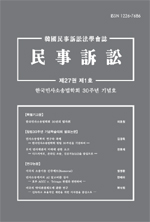Traditionally, the medium for recording and transmitting thoughts has been a tangible object: paper. With the development of science and technology, electronic documents are interpreted as tangible documents, even without the mediation of paper, as intangible information. Therefore, it must be said that the concept of an electronic document is only possible through legislation and is difficult to achieve through pure legal interpretation. Korea has transformed intangible ‘information’ into ‘electronic documents,’ which are treated as tangible objects through legislation, and such examples do not exist in Germany or Japan. Korea might be the world's first in this field, befitting its reputation as an IT powerhouse. Following the introduction, this paper discusses the concept of electronic documents, their legal nature, and their significance in litigation. In developing this paper, I reviewed Japanese Civil Procedure Act and German Civil Procedure Act to examine the differences with our country. In the process, I explained that while electronic documents and video pleadings have been fully legislated in Korea, allowing parties to proceed with litigation through electronic documents without appearing in court, Germany has video pleadings but lacks legal measures for electronic documents. In Japan, neither electronic documents nor video pleadings have been legislated, requiring parties to appear in court physically, indicating that, in terms of e-litigation procedures, Japan is less advanced than Korea. Ultimately, I concluded that this accomplishments is because the best talents in our country have concentrated in the judiciary since liberation.
1. 들어가며
2. 전자문서의 개념
3. 전자문서의 법적 성질
4. 소송상 의의(意義)
(0)
(0)
